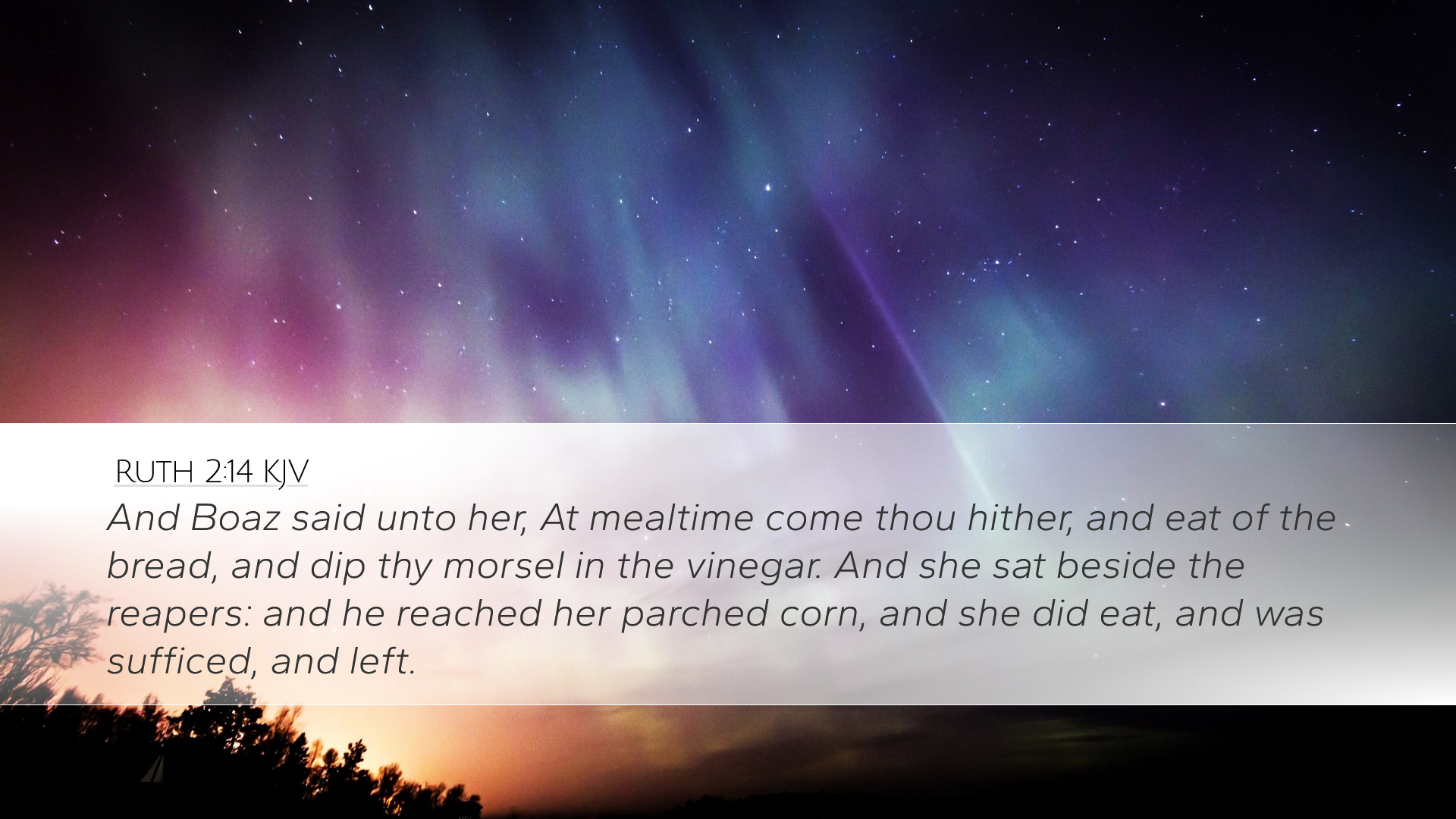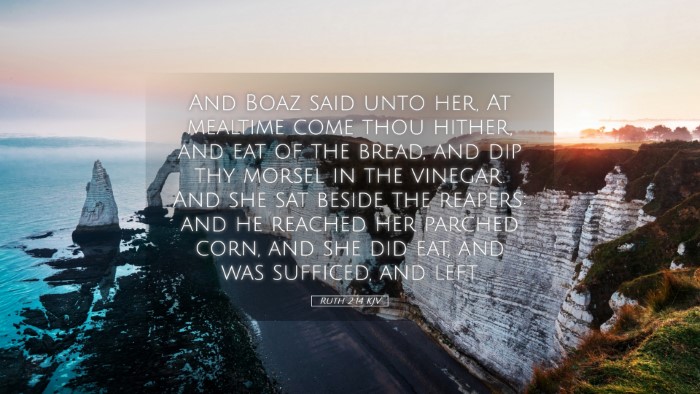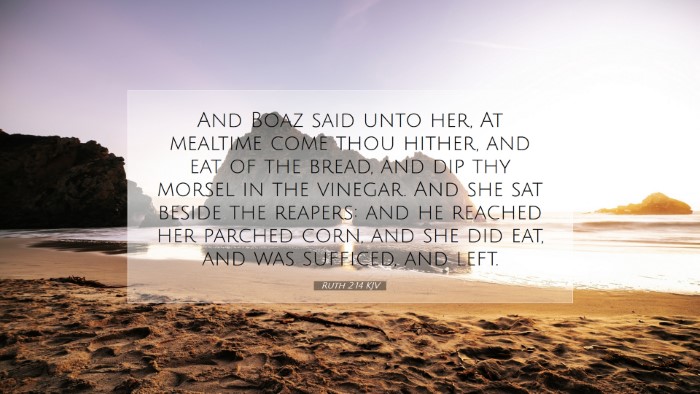Old Testament
Genesis Exodus Leviticus Numbers Deuteronomy Joshua Judges Ruth 1 Samuel 2 Samuel 1 Kings 2 Kings 1 Chronicles 2 Chronicles Ezra Nehemiah Esther Job Psalms Proverbs Ecclesiastes Song of Solomon Isaiah Jeremiah Lamentations Ezekiel Daniel Hosea Joel Amos Obadiah Jonah Micah Nahum Habakkuk Zephaniah Haggai Zechariah MalachiRuth 2:14
Ruth 2:14 KJV
And Boaz said unto her, At mealtime come thou hither, and eat of the bread, and dip thy morsel in the vinegar. And she sat beside the reapers: and he reached her parched corn, and she did eat, and was sufficed, and left.
Ruth 2:14 Bible Commentary
Commentary on Ruth 2:14
Ruth 2:14 (KJV): "And Boaz said unto her, At mealtime come thou hither, and eat of the bread, and dip thy morsel in the vinegar. And she sat beside the reapers: and he reached her parched corn, and she did eat, and was sufficed, and left."
Introduction
The narrative of Ruth provides a profound illustration of loyalty, divine providence, and the interwoven relationships of those who lived during the time of the judges in Israel. Ruth 2:14 depicts a pivotal moment in the relationship between Ruth and Boaz, showcasing themes of grace, acceptance, and the larger narrative of redemption that permeates Scripture.
Contextual Analysis
The Book of Ruth is set against the backdrop of Israel’s turbulent era, characterized by societal chaos and spiritual decline. Ruth, a Moabite widow, chooses to accompany her mother-in-law Naomi back to Bethlehem after the death of their husbands, demonstrating extraordinary loyalty and faith. Ruth's gleaning in the fields of Boaz, a relative of Naomi, signifies a crucial turn in her story.
Insights from Commentaries
- Matthew Henry: Highlights the kindness of Boaz as a reflection of God's provision. He observes that Boaz's invitation to Ruth to dine with him offers an instance of social elevation and acceptance in a society that often marginalized the foreigner.
- Albert Barnes: Expounds on the significance of sharing a meal in ancient cultures as a display of fellowship and goodwill. Barnes notes that Boaz extends not just physical sustenance, but spiritual hospitality, which can symbolize Christ's invitation to partake in divine grace.
- Adam Clarke: Focuses on the aspects of personal relationship and the importance of meals in the Biblical context. Clarke suggests that the act of dipping bread in vinegar reinforces intimacy and trust, further highlighting the burgeoning relationship between Ruth and Boaz.
Theological Themes
Grace and Acceptance
The act of inviting Ruth to eat at the same table serves as a powerful metaphor for grace. It demonstrates that God's grace is extended to all, irrespective of their background. The inclusion of Ruth, a Moabite, invites theological reflection on the expanding nature of God's covenant community, echoing later New Testament themes of salvation being available to the Gentiles.
Divine Providence
God's providence is conspicuously at play throughout the book of Ruth. Boaz, a relative of Naomi, becomes a key figure in the lineage that leads to King David, and ultimately Christ. This moment of sharing a meal, therefore, is not merely a social event but intersects with God's sovereign plan for redemption.
Social Justice and Care for the Marginalized
Boaz’s treatment of Ruth sets a standard for how society should care for the vulnerable and marginalized. His actions resonate with the prophetic tradition that emphasizes justice, mercy, and the protection of the widows and orphans.
Practical Reflections
This verse offers significant lessons for contemporary believers and leaders within the Church. The invitation to sit and eat implies a call to community and fellowship, an essential aspect of Christian living.
- Inclusion in the Community: Just as Ruth was welcomed into the community, churches today are called to embrace and love those who may feel like outsiders.
- The Power of Hospitality: Boaz’s example encourages congregations to create spaces for relational dining, where individuals are fostered in faith and support.
- Recognizing Providence: In every situation, especially in ministry, recognizing God’s hand guiding our steps is fundamental to understanding our purpose.
Conclusion
The brief yet poignant moment captured in Ruth 2:14 conveys much more than the actions of one man toward a woman; it reflects the larger and deeper truths of God’s providential care, the overflow of grace that calls individuals into community, and the anticipation of redemptive history. As one meditates on this verse, it should inspire a profound appreciation of God’s work in our lives, shaping us to extend that same grace and hospitality to others.


